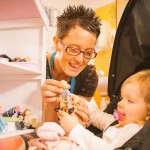 Listening to children, young people and their families enables us to get a better picture of what it is like for them, their lives and experiences, this in turn enhances our practise and impacts on the service we can effect and deliver. How-ever each presentation is unique in nature, each patient is individual, and a situation can change within a blink of an eye, or a touch of a button.
Listening to children, young people and their families enables us to get a better picture of what it is like for them, their lives and experiences, this in turn enhances our practise and impacts on the service we can effect and deliver. How-ever each presentation is unique in nature, each patient is individual, and a situation can change within a blink of an eye, or a touch of a button.
Asking questions within the context of paediatric care, and finding the right language is important to both the health care professional and the child or young person.
Health Play Specialists and Therapeutic Play Practitioners work in different settings and environments such as the playroom or adolescent area enabling them to ask questions in different ways, using visual aids, play and the creative arts, but also choosing the language and the accessibility of these is a key element.
This is important both to children, young people and their families as well as health care professionals.
An open dialogue is formed – this is key to positive engagement and a healthy therapeutic relationship.
The children and young people that present with long term chronic health conditions gives us an opportunity with consent to listen and support their experiences, their views and opinions, and assist them to finding solutions to worries or anxieties.
Specialised and therapeutic play uses different approaches to asking questions, picking up on the physical, visual clues, and the subtle changes that may occur, these are equally important, and in some cases – the most effective ways of quantifying the level of support and expertise we can provide.
Access to Health Play Specialists and Play Teams is of significant value within healthcare, it is also where training and support can be offered if appropriate.
Below are some tips that may help the conversation flow.
• Avoid why questions- open ended questions, that allow conversation to flow provides more of an open platform for children and young people to share more details.
• If you can name and acknowledge the emotion, this should be done with support and training.
• Encourage children and young people to share their experience- youth and peer groups are a great place to start conversations and sharing of ideas.
• Show congruence.
• Track the conversation, picking up on how they tell it, their physical movements and non-verbal clues.
• Be aware and acknowledge blocks to listening, environmental, and situational.
To hear the unheard, to listen to the unspoken, is not always easy, accessible or trouble free, but it is a way of looking at a bigger health picture in a different way.